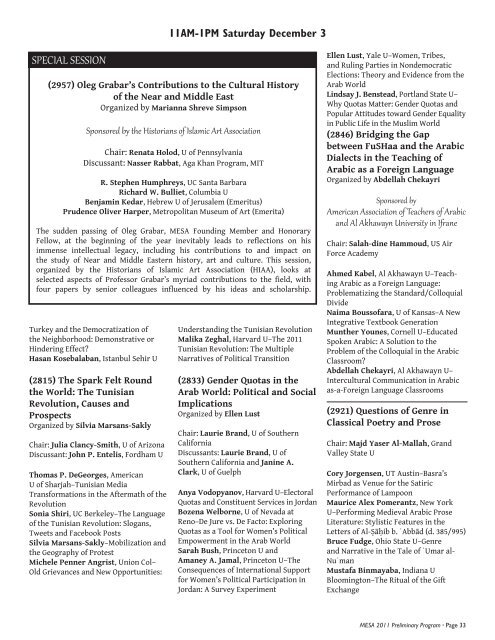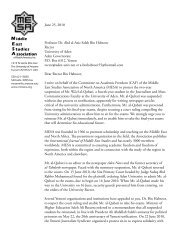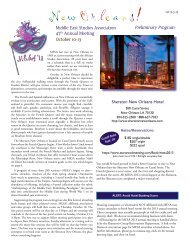Washington DC - Middle East Studies Association - University of ...
Washington DC - Middle East Studies Association - University of ...
Washington DC - Middle East Studies Association - University of ...
You also want an ePaper? Increase the reach of your titles
YUMPU automatically turns print PDFs into web optimized ePapers that Google loves.
SPECIAL SESSION<br />
Turkey and the Democratization <strong>of</strong><br />
the Neighborhood: Demonstrative or<br />
Hindering Effect?<br />
Hasan Kosebalaban, Istanbul Sehir U<br />
(2815) The Spark Felt Round<br />
the World: The Tunisian<br />
Revolution, Causes and<br />
Prospects<br />
Organized by Silvia Marsans-Sakly<br />
Chair: Julia Clancy-Smith, U <strong>of</strong> Arizona<br />
Discussant: John P. Entelis, Fordham U<br />
Thomas P. DeGeorges, American<br />
U <strong>of</strong> Sharjah–Tunisian Media<br />
Transformations in the Aftermath <strong>of</strong> the<br />
Revolution<br />
Sonia Shiri, UC Berkeley–The Language<br />
<strong>of</strong> the Tunisian Revolution: Slogans,<br />
Tweets and Facebook Posts<br />
Silvia Marsans-Sakly–Mobilization and<br />
the Geography <strong>of</strong> Protest<br />
Michele Penner Angrist, Union Col–<br />
Old Grievances and New Opportunities:<br />
11AM-1PM Saturday December 3<br />
(2957) Oleg Grabar’s Contributions to the Cultural History<br />
<strong>of</strong> the Near and <strong>Middle</strong> <strong>East</strong><br />
Organized by Marianna Shreve Simpson<br />
Sponsored by the Historians <strong>of</strong> Islamic Art <strong>Association</strong><br />
Chair: Renata Holod, U <strong>of</strong> Pennsylvania<br />
Discussant: Nasser Rabbat, Aga Khan Program, MIT<br />
R. Stephen Humphreys, UC Santa Barbara<br />
Richard W. Bulliet, Columbia U<br />
Benjamin Kedar, Hebrew U <strong>of</strong> Jerusalem (Emeritus)<br />
Prudence Oliver Harper, Metropolitan Museum <strong>of</strong> Art (Emerita)<br />
The sudden passing <strong>of</strong> Oleg Grabar, MESA Founding Member and Honorary<br />
Fellow, at the beginning <strong>of</strong> the year inevitably leads to reflections on his<br />
immense intellectual legacy, including his contributions to and impact on<br />
the study <strong>of</strong> Near and <strong>Middle</strong> <strong>East</strong>ern history, art and culture. This session,<br />
organized by the Historians <strong>of</strong> Islamic Art <strong>Association</strong> (HIAA), looks at<br />
selected aspects <strong>of</strong> Pr<strong>of</strong>essor Grabar’s myriad contributions to the field, with<br />
four papers by senior colleagues influenced by his ideas and scholarship.<br />
Understanding the Tunisian Revolution<br />
Malika Zeghal, Harvard U–The 2011<br />
Tunisian Revolution: The Multiple<br />
Narratives <strong>of</strong> Political Transition<br />
(2833) Gender Quotas in the<br />
Arab World: Political and Social<br />
Implications<br />
Organized by Ellen Lust<br />
Chair: Laurie Brand, U <strong>of</strong> Southern<br />
California<br />
Discussants: Laurie Brand, U <strong>of</strong><br />
Southern California and Janine A.<br />
Clark, U <strong>of</strong> Guelph<br />
Anya Vodopyanov, Harvard U–Electoral<br />
Quotas and Constituent Services in Jordan<br />
Bozena Welborne, U <strong>of</strong> Nevada at<br />
Reno–De Jure vs. De Facto: Exploring<br />
Quotas as a Tool for Women’s Political<br />
Empowerment in the Arab World<br />
Sarah Bush, Princeton U and<br />
Amaney A. Jamal, Princeton U–The<br />
Consequences <strong>of</strong> International Support<br />
for Women’s Political Participation in<br />
Jordan: A Survey Experiment<br />
Ellen Lust, Yale U–Women, Tribes,<br />
and Ruling Parties in Nondemocratic<br />
Elections: Theory and Evidence from the<br />
Arab World<br />
Lindsay J. Benstead, Portland State U–<br />
Why Quotas Matter: Gender Quotas and<br />
Popular Attitudes toward Gender Equality<br />
in Public Life in the Muslim World<br />
(2846) Bridging the Gap<br />
between FuSHaa and the Arabic<br />
Dialects in the Teaching <strong>of</strong><br />
Arabic as a Foreign Language<br />
Organized by Abdellah Chekayri<br />
Sponsored by<br />
American <strong>Association</strong> <strong>of</strong> Teachers <strong>of</strong> Arabic<br />
and Al Akhawayn <strong>University</strong> in Ifrane<br />
Chair: Salah-dine Hammoud, US Air<br />
Force Academy<br />
Ahmed Kabel, Al Akhawayn U–Teaching<br />
Arabic as a Foreign Language:<br />
Problematizing the Standard/Colloquial<br />
Divide<br />
Naima Bouss<strong>of</strong>ara, U <strong>of</strong> Kansas–A New<br />
Integrative Textbook Generation<br />
Munther Younes, Cornell U–Educated<br />
Spoken Arabic: A Solution to the<br />
Problem <strong>of</strong> the Colloquial in the Arabic<br />
Classroom?<br />
Abdellah Chekayri, Al Akhawayn U–<br />
Intercultural Communication in Arabic<br />
as-a-Foreign Language Classrooms<br />
(2921) Questions <strong>of</strong> Genre in<br />
Classical Poetry and Prose<br />
Chair: Majd Yaser Al-Mallah, Grand<br />
Valley State U<br />
Cory Jorgensen, UT Austin–Basra’s<br />
Mirbad as Venue for the Satiric<br />
Performance <strong>of</strong> Lampoon<br />
Maurice Alex Pomerantz, New York<br />
U–Performing Medieval Arabic Prose<br />
Literature: Stylistic Features in the<br />
Letters <strong>of</strong> Al-Ṣāḥib b. ʿAbbād (d. 385/995)<br />
Bruce Fudge, Ohio State U–Genre<br />
and Narrative in the Tale <strong>of</strong> ʿUmar al-<br />
Nuʿman<br />
Mustafa Binmayaba, Indiana U<br />
Bloomington–The Ritual <strong>of</strong> the Gift<br />
Exchange<br />
u MESA 2011 Preliminary Program Page 33





